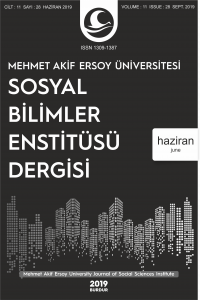Abstract
Keywords
Russian Foreign Policy Security Eurasianism Commonwealth of Independent States Shanghai Cooperation Organisation Collective Security Treaty Organisation
References
- Institute of International Affairs, Occasional UI Papers, No: 1, 1-23.
- Oliker, O., Crane, K., Schwartz, L. H. ve Yusupov, C. (2009). Russian Foreign Policy Sources and Implications, Pennsylvania: RAND.
- Plekhanov, S. The Evolution of Russian Foreign Policy, Erişim 23.07.2018 http://www.yorku.ca/splekhan/docs/4280-5280/Evolution%20of%20Russian%20Foreign%20Policy.pdf
- Póti, L. (2008). Evolving Russian Foreign and Security Policy: Interpreting the Putin-doctrine, Acta Slavica Iaponica, Cilt 25, 29-42.
- Putin, V. (2007). Speech and the Following Discussion at the Munich Conference on Security
- Policy, Erişim 08.07.2018, http://en.kremlin.ru/events/president/transcripts/24034
- Semerikov, V. (2013). KGAÖ’nün Kolektif Güvenlik Sistemi, (Çev: A. İsina),Erişim 13.08.2018 http://www.tasam.org/tr-TR/Icerik/26764/kgaonun_kolektif_guvenlik_sistemi
- Somuncuoğlu, A. (2011). Rusya’nın Orta Asya Güvenlik Politikası: İç Güvenlik Krizlerinde Müdahale, 21. Yüzyıl, (26), 29-36.
- Stepanova, E. (2016). Russia’s Policy on Syria after the Start of Military Engagement, PONARS Eurasia Policy Memo, (421), 1-7.
- Sucu, A. E. (2017). The Importance of Russian Military Presence in Central Asia for Russia’s Regional Security, Akademik Hassasiyetler, 4(8), 125-138.
- Tellal, E. (2010). Zümrüdüanka: Rusya Federasyonu’nun Dış Politikası, Ankara Üniversitesi SBF Dergisi, 65(3), 189-236.
- The Ministry of Foreign Affairs of the Russian Federation, Foreign Policy Concept of the Russian Federation (30.11.2016). Erişim 28.08.2018, http://www.mid.ru/en/foreign_policy/official_documents/-/asset_publisher/CptICkB6BZ29/content/id/2542248
- The Shanghai Cooperation Organisation (2017). Erişim 25.08.2018, http://eng.sectsco.org/about_sco/
- Timofeev, I. Kortunov A. ve Utkin S. (Ed.), (2017). Theses on Russia’s Foreign Policy and Global Positioning (2017–2024), Russian International Affairs Council Center For Strategic Research, 4-34.
- Ünal, G. (2016). Putin Dönemi Rus Dış Politikasında Batı’ya Karşı “Yumuşak Dengeleme” Arayışları, Yayınlanmamış Yüksek Lisans Tezi, Eskişehir Osmangazi Üniversitesi Sosyal Bilimler Enstitüsü.
- Weinstein, A. (2007). Russian Phoenix: The Collective Security Treaty Organization, The Whitehead Journal of Diplomacy and International Relations, 8, 167-180.
- Willerton, J. P. ve Cockerham, G. (2003). Russia, the CIS and Eurasian Interconnections, Sperling, J., Kay, S. ve Papacosma, S. V. (Ed), Limiting Institutions? The challenge of Eurasian Security Governance içinde (185-207), Manchester, New York: Manchester University Press.
- Yardımcıoğlu, M. ve Koçarslan H. (2012). Çok Kutuplu Dünyaya Doğru: Şanghay İşbirliği Örgütü, Kahramanmaraş Sütçü İmam Üniversitesi İktisadi ve İdari Bilimler Fakültesi Dergisi, 2(2), 163-174.
- Yesevi, Ç. G., (2013). Orta Asya’da İşbirliği ve Bütünleşme: Kolektif Güvenlik Antlaşması Örgütü Örneği, Küresel Eğilimler Serisi Çalışma Kağıdı, (4), 1-12.
- Zakaurtseva, T. (2013). The Current Foreign Policy of Russia, Social Research Center, 87-112.
Abstract
Keywords
Rus dış politikası Güvenlik Avrasyacılık Bağımsız Devletler Topluluğu Şanghay İşbirliği Örgütü Kolektif Güvenlik Antlaşması Örgütü
References
- Institute of International Affairs, Occasional UI Papers, No: 1, 1-23.
- Oliker, O., Crane, K., Schwartz, L. H. ve Yusupov, C. (2009). Russian Foreign Policy Sources and Implications, Pennsylvania: RAND.
- Plekhanov, S. The Evolution of Russian Foreign Policy, Erişim 23.07.2018 http://www.yorku.ca/splekhan/docs/4280-5280/Evolution%20of%20Russian%20Foreign%20Policy.pdf
- Póti, L. (2008). Evolving Russian Foreign and Security Policy: Interpreting the Putin-doctrine, Acta Slavica Iaponica, Cilt 25, 29-42.
- Putin, V. (2007). Speech and the Following Discussion at the Munich Conference on Security
- Policy, Erişim 08.07.2018, http://en.kremlin.ru/events/president/transcripts/24034
- Semerikov, V. (2013). KGAÖ’nün Kolektif Güvenlik Sistemi, (Çev: A. İsina),Erişim 13.08.2018 http://www.tasam.org/tr-TR/Icerik/26764/kgaonun_kolektif_guvenlik_sistemi
- Somuncuoğlu, A. (2011). Rusya’nın Orta Asya Güvenlik Politikası: İç Güvenlik Krizlerinde Müdahale, 21. Yüzyıl, (26), 29-36.
- Stepanova, E. (2016). Russia’s Policy on Syria after the Start of Military Engagement, PONARS Eurasia Policy Memo, (421), 1-7.
- Sucu, A. E. (2017). The Importance of Russian Military Presence in Central Asia for Russia’s Regional Security, Akademik Hassasiyetler, 4(8), 125-138.
- Tellal, E. (2010). Zümrüdüanka: Rusya Federasyonu’nun Dış Politikası, Ankara Üniversitesi SBF Dergisi, 65(3), 189-236.
- The Ministry of Foreign Affairs of the Russian Federation, Foreign Policy Concept of the Russian Federation (30.11.2016). Erişim 28.08.2018, http://www.mid.ru/en/foreign_policy/official_documents/-/asset_publisher/CptICkB6BZ29/content/id/2542248
- The Shanghai Cooperation Organisation (2017). Erişim 25.08.2018, http://eng.sectsco.org/about_sco/
- Timofeev, I. Kortunov A. ve Utkin S. (Ed.), (2017). Theses on Russia’s Foreign Policy and Global Positioning (2017–2024), Russian International Affairs Council Center For Strategic Research, 4-34.
- Ünal, G. (2016). Putin Dönemi Rus Dış Politikasında Batı’ya Karşı “Yumuşak Dengeleme” Arayışları, Yayınlanmamış Yüksek Lisans Tezi, Eskişehir Osmangazi Üniversitesi Sosyal Bilimler Enstitüsü.
- Weinstein, A. (2007). Russian Phoenix: The Collective Security Treaty Organization, The Whitehead Journal of Diplomacy and International Relations, 8, 167-180.
- Willerton, J. P. ve Cockerham, G. (2003). Russia, the CIS and Eurasian Interconnections, Sperling, J., Kay, S. ve Papacosma, S. V. (Ed), Limiting Institutions? The challenge of Eurasian Security Governance içinde (185-207), Manchester, New York: Manchester University Press.
- Yardımcıoğlu, M. ve Koçarslan H. (2012). Çok Kutuplu Dünyaya Doğru: Şanghay İşbirliği Örgütü, Kahramanmaraş Sütçü İmam Üniversitesi İktisadi ve İdari Bilimler Fakültesi Dergisi, 2(2), 163-174.
- Yesevi, Ç. G., (2013). Orta Asya’da İşbirliği ve Bütünleşme: Kolektif Güvenlik Antlaşması Örgütü Örneği, Küresel Eğilimler Serisi Çalışma Kağıdı, (4), 1-12.
- Zakaurtseva, T. (2013). The Current Foreign Policy of Russia, Social Research Center, 87-112.
Details
| Primary Language | Turkish |
|---|---|
| Journal Section | Research Articles |
| Authors | |
| Publication Date | June 26, 2019 |
| Submission Date | September 7, 2018 |
| Acceptance Date | June 25, 2019 |
| Published in Issue | Year 2019 Volume: 11 Issue: 28 |
Cited By
THE EFFECTS OF GLOBALIZATION ON RUSSIA'S SECURITY APPROACH: THREATS AND RESPONSE
Gaziantep University Journal of Social Sciences
https://doi.org/10.21547/jss.1092578

This work is licensed under a Creative Commons Attribution-NonCommercial 4.0 International License.


